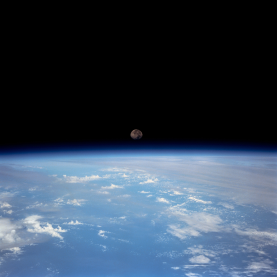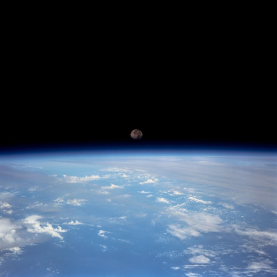Find out about The Open University's Science courses and qualifications.
-
Explore Moon rocks collected from the first Moon landing
Take part now to access more details of Explore Moon rocks collected from the first Moon landingUse our Virtual Microscope to examine a selection of Moon rocks collected by Neil Armstrong and Buzz Aldrin, from the Apollo 11 mission in 1969.

-
Apollo 11 and 50 years of research on Moon rocks
Read now to access more details of Apollo 11 and 50 years of research on Moon rocksThe first Moon landing is arguably the most important event for humankind. Dr Mahesh Anand and Dr Andrew G Tindle, shed light on the work which has taken place with the Moon rocks taken from that mission.

-
To the Moon and beyond
Read now to access more details of To the Moon and beyondTara Hayden of the School of Physical Sciences at The Open University, explores the Apollo legacy and the future of human exploration.

-
Living on the Moon
Watch now to access more details of Living on the MoonMembers of The Open University contribute to a video by the Royal Society, explaining how to survive on the Moon for more than a couple of days.

-
Discover Moon minerals
Read now to access more details of Discover Moon mineralsView the Moon Minerals book published by Professor Mahesh Anand and Dr Andy Tindle.

-
Apollo 11’s ‘one small step’ sparked a new rush to reach the Moon
Read now to access more details of Apollo 11’s ‘one small step’ sparked a new rush to reach the MoonWhen Apollo 11 landed on the Moon on 20 July 1969, history was made. Fifty years later, it stands as arguably the greatest achievement of the 20th century and a testament to human endeavour and perseverance.

-
What does Moon music sound like?
Listen now to access more details of What does Moon music sound like?Listen to the Earth’s Reflection – a specially commissioned piece of music composed by Yazz Ahmed in collaboration with Dr Mahesh Anand.

-
Other Moons
Read now to access more details of Other MoonsIt's 50 years since the first human landings on the Moon. Professor David A Rothery explains that we should not forget that there are moons in abundance, elsewhere in our Solar System.

-
Margaret Hamilton: Spaceship Programmer and Software Pioneer
Read now to access more details of Margaret Hamilton: Spaceship Programmer and Software PioneerWithout the work of the lead Apollo flight software designer, Margaret Hamilton, the Eagle would not have landed on the Moon.

-
Multiple Moonlets Maketh Mystery
Watch now to access more details of Multiple Moonlets Maketh MysteryHow did the moon form? Forget a single giant impact – relentless bombardment could explain the Moon’s formation, says Open University research student Zoe Morland.

-
Clavius - a lunar mystery
Read now to access more details of Clavius - a lunar mysteryHow one of the largest and most prominent features on the Moon got its name.

-
Moons of our Solar System
Learn more to access more details of Moons of our Solar SystemIn this free course, Moons of our Solar System, explore the many moons of our Solar System. Find out what makes them special. Should we send humans to our Moon again?

-
How was the Moon made, and when did it happen?
Watch now to access more details of How was the Moon made, and when did it happen?Dave Rothery shares some new thinking about our nearest neighbour.

-
Mythbusting moons
Watch now to access more details of Mythbusting moonsWould we have tides if we had no Moon? Is a ‘supermoon’ an important event? Can moons have moons? Enjoy this short animation.

-
Moon Trumps: Pitch satellite against satellite
Take part now to access more details of Moon Trumps: Pitch satellite against satelliteBecome a master of the universe by winning Moon Trumps.

-
The Moon
Learn more to access more details of The MoonAs the only planetary body everyone is familiar with seeing in the sky, the Moon has long been an object of fascination and speculation. This free course will teach you about the nearest planetary body to Earth: the missions to the Moon, the basic facts of its composition, the cratering on its surface, and the ancient eruptions that flooded many...

-
The Moon - ESA's Interactive Guide
Learn more to access more details of The Moon - ESA's Interactive GuideExplore the 'why' and 'how' of lunar exploration with this interactive guide.

-
Discovering the dark side of the Moon
Watch now to access more details of Discovering the dark side of the MoonWatch Dr Mahesh Anand's lecture on the topic of the dark side of the Moon, which was given to the Royal Astronomical Society.

-
Prospecting for water on the Moon
Read now to access more details of Prospecting for water on the MoonThe last 50 years of lunar science have taught us that the Moon still holds many mysteries. Dr Simeon Barber explores prospecting for water on the Moon.

-
Big moon rising
Read now to access more details of Big moon risingDavid Rothery doesn't think the supermoons we're due to see deserve that much attention. Here's why...

-
The rotating Moon
Read now to access more details of The rotating MoonFind out more about the Moon’s state of synchronous rotation

Rate and Review
Rate this article
Review this article
Log into OpenLearn to leave reviews and join in the conversation.
Article reviews